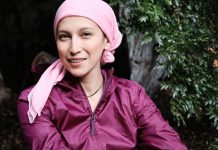
For years, researchers have honed a process of developing breast cancer models using tumors donated by breast cancer patients.
They then implanted into mice as a way to study the tumor’s behavior.
Now, the research team reports a new, more efficient way to grow these tumors.
In addition, they outline a process to test potential drugs to help prioritize clinical therapy choices based on unique tumor characteristics.
The study, published this week in the journal Nature Cancer, creates a way for researchers to narrow the number of drugs that might be effective in each tumor based on its unique characteristics and its behavior in the laboratory models of cancer.
Using this resource, the researchers uncovered experimental and Food and Drug Administration-approved drugs with high efficacy against the models.
They extended this work to personalize therapy for a patient with metastatic breast cancer, which resulted in complete response for the patient and a progression-free survival period more than three times longer than her previous therapies.
“We were able to utilize the data to prioritize therapy options for a patient,” says Alana Welm, Ph.D., co-lead author, breast cancer researcher at Huntsman Cancer Institute, and professor of oncological sciences at the U of U.
“While this therapy was unfortunately not curative, it led to regression of the patient’s tumor and a longer survival period.”
Welm says this unique bank of tumor models is critical to advancing research on aggressive breast cancers.
“It is also, to our knowledge, the first time that such models have been used to influence the therapy choice of a breast cancer patient in a clinical trial setting.”
A new clinical trial called FORESEE (NCT04450706) builds on the findings of this study.
With a second trial in development, researchers will use the models to predict recurrence for a subset of newly diagnosed breast cancer patients, and then attempt to personalize therapy for the metastatic stage of the disease when recurrence happens.
If you care about breast cancer risk, please read studies about diet that could increase breast cancer risk, and drug that could fight hard-to-treat breast cancers.
For more information about breast cancer, please see recent studies about healthy levels of vitamin D that may boost breast cancer outcomes, and results showing this diabetes drug may help treat aggressive breast cancer.
The study was conducted by Katrin P. Guillen et al., and published in Nature Cancer.



